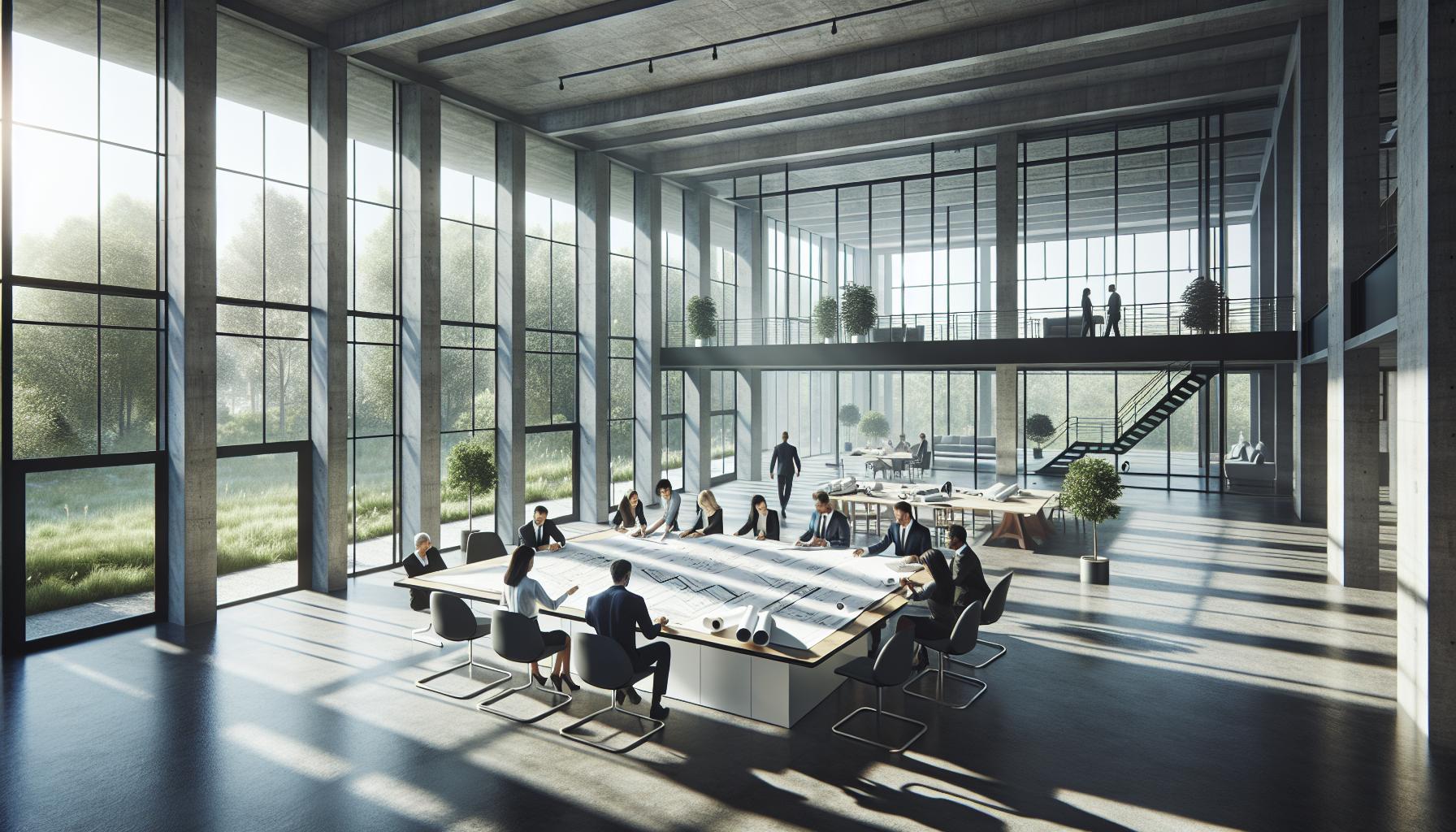In a world where cookie-cutter buildings seem to multiply like rabbits, an architectural design consultant is the superhero every project needs. Armed with creativity and a keen eye for detail, they transform mundane spaces into stunning masterpieces that make jaws drop and hearts skip a beat. Forget about bland blueprints; these consultants bring dreams to life, crafting environments that are as functional as they are fabulous.
But what exactly does an architectural design consultant do? Think of them as the matchmakers of the construction world, pairing clients with innovative designs that suit their unique needs. Whether it’s a cozy home or a sprawling commercial complex, they ensure every inch tells a story. So if you’re ready to ditch the ordinary and embrace the extraordinary, it’s time to discover how an architectural design consultant can elevate your vision to new heights.
Architectural Design Consultant
Architectural design consultants play a critical role in the development of spaces that harmonize functionality and aesthetics. They possess specialized knowledge in creating designs that align closely with client expectations, whether for residential dwellings or commercial establishments. Their expertise allows for the identification of unique requirements, ensuring each project stands out.
These consultants utilize their creativity to propose innovative solutions, addressing challenges in the design and construction phases. Attention to detail ensures that every aspect of a project, from structure to style, meets the highest standards. Successful consultations rely on understanding both the client’s vision and the practical constraints of the site.
Collaboration emerges as a key element in the consulting process. By partnering with architects, engineers, and contractors, architectural design consultants facilitate a cohesive approach to project delivery. This teamwork enhances information flow, minimizes misunderstandings, and accelerates project timelines.
Comprehensive services provided by consultants may include site analysis, design concept development, and project management. Each phase involves careful planning and execution, tailored to navigate the complexities of building codes and zoning laws. Their insights contribute to sustainable practices, promoting environmentally friendly designs.
Effective communication stands at the foundation of their work. Regular updates and consultations help maintain alignment with client goals and expectations. This ensures that the finished project not only meets functional needs but also resonates on an emotional level with its users.
Services Offered By Architectural Design Consultants

Architectural design consultants provide a range of services that cater to client specifications and project requirements. These services ensure a seamless design process tailored to each unique project.
Conceptual Design
Conceptual design focuses on transforming initial ideas into visual representations. This stage involves brainstorming and sketching multiple design alternatives. Consultants prioritize client’s input to align visions with practical solutions. By examining site constraints and environmental factors, they create designs that enhance usability. Early consideration of aesthetics plays a significant role in allowing clients to envision the final product.
Schematic Design
Schematic design serves as a bridge between concepts and detailed planning. This phase includes developing floor plans, elevations, and 3D models. Consultants examine spatial relationships and functionality thoroughly during schematic design. They collaborate with clients to refine details, ensuring all requirements are met efficiently. This step provides a clear overview of design intentions, enabling clients to visualize how various elements connect.
Design Development
Design development refines the selected schematic designs into detailed documents. At this stage, architectural elements, materials, and system integrations are specified. Consultants focus on compliance with building codes and sustainability guidelines as they finalize selections. By coordinating with engineers and contractors, they ensure all aspects align seamlessly. Clients benefit from this comprehensive review, leading to informed decisions and enhanced project success.
Importance Of Architectural Design Consultants

Architectural design consultants play a crucial role in refining spaces and ensuring they resonate with their intended use. These professionals enhance the overall experience by combining structure and artistry.
Enhancing Aesthetic Appeal
Architectural design consultants significantly elevate aesthetic appeal through creative vision and innovative solutions. They focus on color palettes, material selections, and spatial arrangements to create visually striking environments. Engaging with clients fosters a collaborative atmosphere, where preferences guide the design. Each project benefits from a tailored approach that prioritizes not just beauty but also harmony with surroundings. Attention to detail allows consultants to bridge functionality with style, ensuring that designs reflect the client’s personality. Unique elements, such as custom fixtures and landscaping, further enrich the space, leaving a lasting impression on users.
Ensuring Functional Spaces
Creating functional spaces is a primary focus for architectural design consultants. They analyze project requirements carefully, considering traffic flow and user interaction. Effective layouts promote efficiency while ensuring comfort for occupants. Assessing individual needs allows these consultants to tailor designs that maximally utilize space. Collaborations with engineers and contractors enhance practicality and construction feasibility. Compliance with zoning laws and building codes remains essential in this process. By prioritizing both aesthetics and functionality, architectural design consultants deliver spaces that not only look good but also serve their purpose efficiently, ensuring a satisfying user experience.
Skills Required For Architectural Design Consultants

Architectural design consultants need a blend of technical and soft skills to excel in their roles. These competencies enable them to transform client visions into practical, innovative designs while ensuring seamless collaboration.
Technical Skills
Proficiency in design software is essential for architectural design consultants. Tools like AutoCAD, Revit, and SketchUp allow them to create detailed plans and 3D models. Understanding building codes and zoning laws ensures compliance throughout the design process. Knowledge of materials and construction techniques aids in selecting the right components for a project. Ability to conduct site analysis helps consultants identify the optimal layouts and configurations for spaces. Familiarity with sustainable design practices contributes to eco-friendly solutions, making projects both functional and responsible.
Soft Skills
Strong communication skills facilitate clear interactions with clients, architects, and contractors. Active listening is vital to understand client needs and respond effectively to queries. Creativity enhances their ability to propose unique design solutions that set projects apart. Problem-solving skills are crucial for addressing challenges during design and construction phases. Adaptability allows consultants to adjust plans based on client feedback or changing project requirements. Time management ensures that projects are completed within deadlines, maintaining quality and client satisfaction throughout the process.
Choosing The Right Architectural Design Consultant
Selecting the right architectural design consultant is crucial for project success. Several factors influence this decision.
Factors To Consider
Experience plays a significant role in evaluating potential consultants. Review their project portfolio to assess the quality and style of completed work. Expertise in specific project types, such as residential or commercial, can enhance project relevance. Communication skills matter, as effective dialogue promotes collaboration and minimizes misunderstandings. Establish a consultant’s familiarity with local building codes and zoning laws to ensure compliance. Additionally, consider their design philosophy. Alignment with the client’s vision is vital for achieving desired outcomes.
Questions To Ask
Begin by inquiring about the consultant’s previous projects. Request details on similar projects they’ve completed and outcomes achieved. Ask about their design process to understand how they navigate each stage. Can they explain how they handle revisions and incorporate client feedback? Discuss their approach to collaboration with other professionals, such as contractors and engineers. Ensure they provide insights on managing project timelines and budgets. Finally, seek testimonials from past clients to gauge satisfaction and project success.
Architectural design consultants play a pivotal role in crafting spaces that are not only functional but also visually appealing. Their expertise in harmonizing aesthetics with practicality ensures that every project meets the unique needs of clients while adhering to industry standards.
Choosing the right consultant can significantly impact the success of a project. By focusing on experience, communication skills, and a strong portfolio, clients can find a partner who truly understands their vision. Ultimately, these professionals are instrumental in transforming ideas into reality, making them invaluable in the world of architecture and design.



